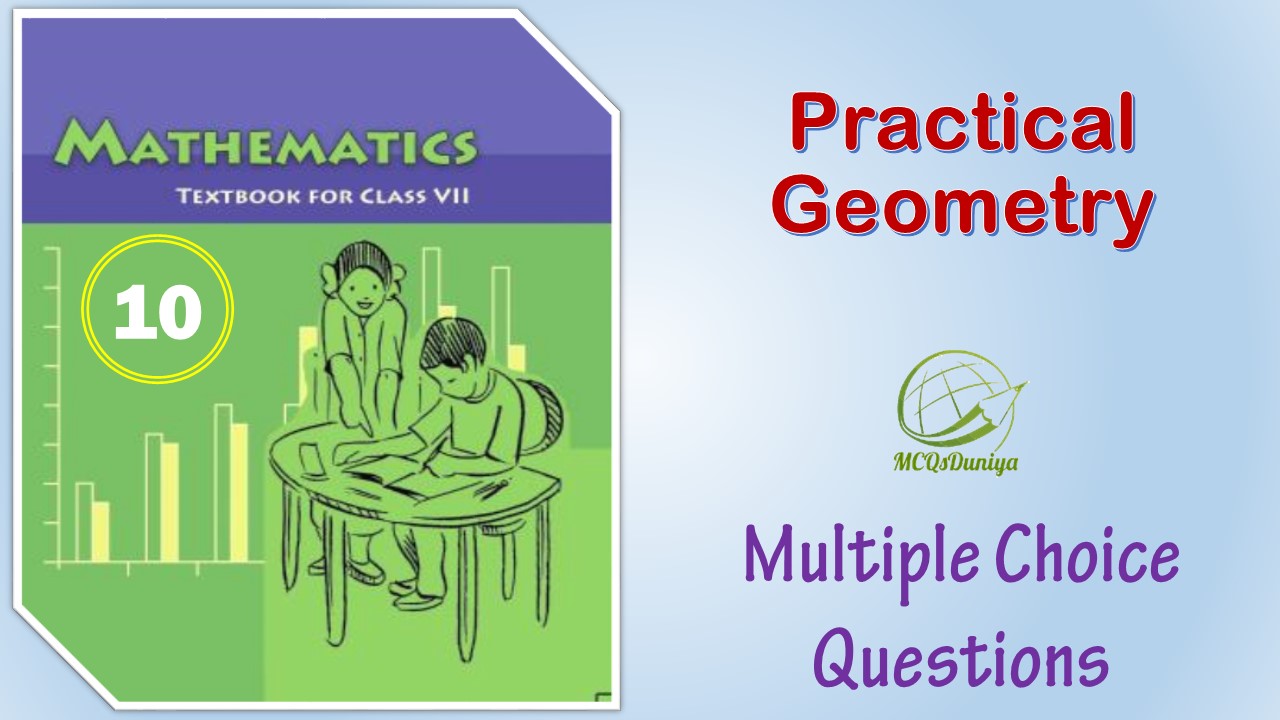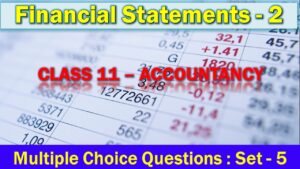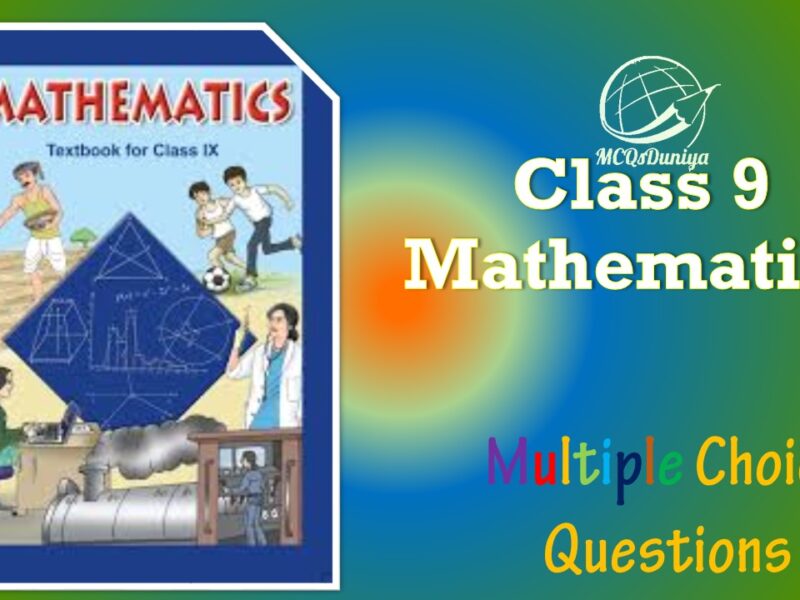Class 7 Mathematics MCQ Practical Geometry with Answers is Prepared Based on Latest Exam Pattern. Students can solve NCERT Class 7 Mathematics MCQ Practical Geometry with Answers to know their preparation level.
Students who are searching for NCERT Class 7 Mathematics MCQ Practical Geometry with Answers are compiled here to get good practice on all fundamentals. Know your preparation level on MCQ Questions for Class 7 Mathematics MCQ Practical Geometry with Answers. You can also verify your answers from the provided Class 7 Mathematics MCQ Practical Geometry with Answers. So, ace up your preparation with MCQ of Class 7 Mathematics MCQ & NCERT Textbook solutions Examinations.
CBSE Class 7 Mathematics MCQ
Practical Geometry
with Answers
Question 1: How many lines can draw from a given point.
(A) 1
(B) 2
(C) Infinite
(D) None of these
Answer : (c) InfiniteShow Answer :
Question 2: How many parallel lines can draw from a outside point of a given line ?
(A) 1
(B) 2
(C) Infinite
(D) None of these
Answer : (a) 1Show Answer :
Question 3: Which among the following is used to construct a triangle?
(A) The lengths of the three sides.
(B) The perimeter of the triangle.
(C) The measures of three angles.
(D) The names of three vertices.
Answer : (a) The lengths of the three sides.Show Answer :
Question 4: How many parallel lines can be drawn passing through a point, not on the given line?
(A) 2
(B) 1
(C) 3
(D) 0
Answer : (b) 1Show Answer :
Question 5: In which of the following cases is the construction of a triangle not possible?
(A) Measures of 3 sides are given.
(B) Measures of 2 sides and an included angle are given.
(C) Measures of 2 angles and a side are given.
(D) Measures of 3 angles are given.
Answer : (d) Measures of 3 angles are given.Show Answer :
Question 6: dentify the true statement.
(A) A triangle with 3 equal sides is isosceles.
(B) A triangle with a 110o angle is right angled.
(C) A triangle with 3 acute angles is acute angled.
(D) A triangle with 2 equal sides is equilateral.
Answer : (c) A triangle with 3 acute angles is acute angled.Show Answer :
Question 7: A Choose the correct option in which a triangle CANNOT be constructed with the given lengths of sides.
(A) 3 cm, 4 cm, 5 cm
(B) 7 cm, 6 cm, 5 cm
(C) 10 cm, 7 cm, 2 cm
(D) 12 cm, 8 cm, 6 cm
Answer : (c) 10 cm, 7 cm, 2 cmShow Answer :
Question 8: Which is the longest side in the triangle ABC right angled at B?
(A) BC
(B) AC
(C) AB
(D) None of these
Answer : (b) ACShow Answer :
Question 9: ΔPQR is a triangle right-angled at P. If PQ = 3 cm and PR = 4 cm, find QR.
(A) 3 cm
(B) 7 cm
(C) 5 cm
(D) 8 cm
Answer : (c) 5 cmShow Answer :
Question 10: Which is the longest side in the triangle PQR right angled at P?
(A) PR
(B) PQ
(C) QR
(D) None of these
Answer : (c) QRShow Answer :
Question 11: The sum of the lengths of any two sides of a triangle is _____________ the third side of the triangle.
(A) less than
(B) doubled
(C) greater than
(D) half
Answer : (c) greater thanShow Answer :
Question 12: A/an _____________ connect a vertex of a triangle to the mid-point of the opposite side.
(A) altitude
(B) vertex
(C) median
(D) None of these
Answer : (c) medianShow Answer :
Question 13: In the Pythagoras property, the triangle must be ___________ .
(A) acute-angled
(B) obtuse-angled
(C) right-angled
(D) None of these
Answer : (c) right-angledShow Answer :
Question 14: Which is the longest side of a right triangle?
(A) Hypotenuse
(B) Base
(C) Perpendicular
(D) None of these
Answer : (a) HypotenuseShow Answer :
Question 15: A triangle in which all three sides are of equal lengths is called _________.
(A) Equilateral
(B) Scalene
(C) Isosceles
(D) None of these
Answer : (a) EquilateralShow Answer :
Question 16: A triangle can be drawn if the hypotenuse and a _____ in the case of a right-angled triangle.
(A) base
(B) hypotenuse
(C) leg
(D) None of these
Answer : (c) legShow Answer :
Question 17: Sum of the lengths of any two sides of a triangle is greater than the length of the ____.
(A) first side
(B) second side
(C) third side
(D) none of these
Answer : (c) third sideShow Answer :
Question 18: A triangle can be drawn if ____ angles and one side given.
(A) 2
(B) 3
(C) 4
(D) None of these
Answer : (a) 2Show Answer :
Question 19: he exterior angle of a triangle is ______ in measure to the sum of interior opposite angles.
(A) equal
(B) unequal
(C) different
(D) None of these
Answer : (a) equalShow Answer :
Question 20: ΔABC is right-angled at C. If AC = 5 cm and BC = 12 cm find the length of AB.
(A) 17 cm
(B) 7 cm
(C) 13 cm
(D) None of these
Answer : (c) 13 cmShow Answer :
Below are given the maximum of certain sides and angles of triangles. Identify those can be constructed and these can not he constructed.
Question 21: ∆ABC m∠A = 85°,m∠B = 115, AB = 5cm
Answer : NoShow Answer :
Question 22: ∆PQR m∠Q = 30,m∠R = 60, QR = 4.7cm
Answer : YesShow Answer :
Question 23: ∆ABC m∠A = 70,m∠B = 50, AC = 3cm
Answer : YesShow Answer :
Question 24: ∆LMN m∠L = 60, m∠N = 120,LM = 5cm
Answer : NoShow Answer :
Question 25: ∆ABC BC = 2cm, AB = 4cm, AC = 2cm
Answer : NoShow Answer :
Question 26: ∆PQR PQ = 3.5cm, QR = 4cm, PR = 3.5cm
Answer : YesShow Answer :
Question 27: ∆XYZ XY = 3cm, YZ= 4cm, XZ = 5cm
Answer : YesShow Answer :
Question 28: ∆DEF DE = 4.5cm, EF = 5.5cm, DF = 4cm
Answer : YesShow Answer :
Question 29: In ΔRST, R = 5 cm, and ∠SRT = 45° and ∠RST = 45°. Which criterion can be used to construct ΔRST?
(A) A.S.A. criterion
(B) S.A.S. criterion
(C) S.S.S. criterion
(D) R.H.S. criterion
Answer : (a) A.S.A. criterionShow Answer :
Hint:
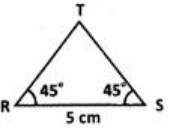
Clearly, from the figure two angles and the included side are given. So, A.S.A. criterion can be used to construct ARST.
Question 30: Identify the criterion of construction of the equilateral triangle LMN given LM = 6 cm.
(A) S.A.S. criterion
(B) R.H.S. criterion
(C) A.S.A. criterion
(D) S.S.S. criterion
Answer : (d) S.S.S. criterionShow Answer :
Hint:
Since ALMN is equilateral the measurement of one side is used for the other two sides of the triangle. Hence ALMN can be constructed by S.S.S. criterion.
Question 31: The idea of equal alternate angles is used to construct which of the following?
(A) A line parallel to a given line
(B) A triangle
(C) A square
(D) Two triangles
Answer : (a) A line parallel to a given line.Show Answer :
Question 32: A Given AB = 3 cm, AC = 5 cm,and ∠B = 30°, ΔABC cannot be uniquely constructed, with AC as base, why?
(A) Two sides and included angle are given.
(B) The other two angles are not given.
(C) The vertex B cannot be uniquely located.
(D) The vertex A coincides with the vertex C.
Answer : (c) The vertex B cannot be uniquely located.Show Answer :
Question 33: A line panda point X not on it are given. Which of the following is used to draw a line parallel to p through X?
(A) Equal corresponding angles.
(B) Congruent triangles.
(C) Angle sum property of triangles.
(D) Pythagoras’ theorem.
Answer : (a) Equal corresponding angles.Show Answer :
Hint:
Corresponding angles of parallel lines are equal.
Question 34: Δ PQR is such that ∠P = ∠Q = ∠R = 60° which of the following is true?
(A) Δ PQR is equilateral.
(B) Δ PQR is acute angled.
(C) Both [a] and [b]
(D) Neither [a] nor [b]
Answer : (c) Both [a] and [b]Show Answer :
Hint:
In ΔPQR since all the angles are acute, it is acute angled. Also since all the angles are equal, it is equilateral.
Question 35: Which vertex of ΔABC is right angled if
(A) ∠C
(B) ∠A
(C) ∠B
(D) A or C
Answer : (b) ∠AShow Answer :
Hint:
From the given measurements,
Question 36: An isosceles triangle is constructed as shown in the figure.

Which of the given statements is incorrect?
(A)
(B) ΔPQR is an equilateral triangle.
(C) ΔPQR is a right angled triangle.
(D) If right angled ΔPQR has its equal angles measuring 45° each.
Answer : (b) ΔPQR is an equilateral triangle.Show Answer :
Question 37: ΔPQR is constructed with all its angles measuring 60° each. Which of the following is correct?
(A) ΔPQR is an equilateral triangle.
(B) ΔPQR is isosceles triangle.
(C) ΔPQR is a scalene triangle.
(D) ΔPQR is a right angled triangle.
Answer : (a) ΔPQR is an equilateral triangle.Show Answer :
Question 38: How many perpendicular lines can be drawn to a line from a point not on it?
(A) 1
(B) 2
(C) 0
(D) Infinite
Answer : (a) 1Show Answer :
Hint:
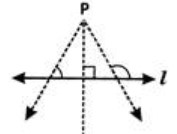
As can be seen from the given figure, one and only one perpendicular line can be drawn to a given line from a point not on it.
Question 39: Identify the false statement.
(A) A triangle with three equal sides is called an equilateral triangle.
(B) A triangle with a right angle is called a right angled triangle
(C) A triangle with two equal sides is called a scalene triangle.
(D) A right angled triangle has two acute angles and a right angle.
Answer : (c) A triangle with two equal sides is called a scalene triangle.Show Answer :
Question 40: ΔPQR is constructed such that PQ = 5 cm, PR = 5 cm and ∠RPQ = 50° Identify the type of triangle constructed.
(A) An isosceles triangle
(B) An acute angled triangle
(C) An obtuse angled triangle
(D) Both [a] and [b]
Answer : (d) Both [a] and [b]Show Answer :
Question 41: Which of the following is NOT constructed using a ruler and a set square?
(A) A perpendicular to a line from a point not on it.
(B) A perpendicular bisector of a line segment.
(C) A perpendicular to a line at a point on the line.
(D) A line parallel to a given line through a given point.
Answer : (b) A perpendicular bisector of a line segment.Show Answer :
Question 42: Study the steps of construction given.
Step 1: Draw a ray OA.
Step 2: With O as centre and any convenient radius draw an arc MN to cut OA at M.
Step 3: With M as centre and the same radius draw an arc to cut MN at P.
Step 4: With P as centre and the same radius, draw an arc to cut MN at Q.
Step 5: Draw OQ and produce it to D. An angle AOD is constructed.
What is the measure of ∠AOD?
(A) 60°
(B) 30°
(C) 120°
(D) 45°
Answer : (c) 120°Show Answer :
Hint:
The given steps of construction are to construct an angle of 120°.
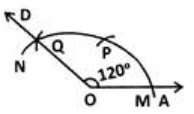
Question 43: In ΔXYZ, x, y and z denote the three sides. Which of the following is incorrect’?
(A) x – y > z
(B) x + z > y
(C) x – y < z
(D) x + y > z
Answer : (a) x – y > zShow Answer :
Hint:
The difference of two sides of a triangle is less than its third side.
Question 44: In which of the following cases can a triangle be constructed?
(A) Measures of three sides are given.
(B) Measures of two sides and an included angle are given.
(C) Measures of two angles and the side between them are given.
(D) All the above.
Answer : (d) All the above.Show Answer :
Question 45: Based on the sides of a triangle, which of the following is a classification of triangles?
(A) A right angled triangle
(B) An acute angled triangle
(C) An obtuse angled triangle
(D) An isosceles triangle
Answer : (d) An isosceles triangleShow Answer :
Question 46: Which of the following is used to draw a line parallel to a given line?
(A) A protractor
(B) A set square
(C) A ruler
(D) A ruler and compasses
Answer : (d) A ruler and compassesShow Answer :
Hint:
A line parallel to a given line can be drawn using a ruler and a compass.
Question 47: Direction: David folds a sheet of paper. The dotted lines as shown in the figure are the creases formed, which are named as l, m and n.
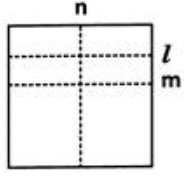
What can you say about lines I and n?
(A) l // n
(B) l ⊥ n
(C) I is the same line as n
(D) Neither [a] nor [b]
Answer : (b) l ⊥ nShow Answer :
Hint:
A 90° angle is formed at the intersection of l and n. So l ⊥ n.
Question 48: A Choose the correct option in which a triangle CANNOT be constructed with the given lengths of sides.
(A) 3 cm, 4 cm, 5 cm
(B) 7 cm, 6 cm, 5 cm
(C) 10 cm, 7 cm, 2 cm
(D) 12 cm, 8 cm, 6 cm
Answer : (c) 10 cm, 7 cm, 2 cmShow Answer :
Hint:
The difference of any two sides of a triangle must be less than the third side. This property of triangles is not satisfied by the given measurements as 10 – 7 = 3 > 2 and 10 – 2 = 8 > 7, though 7 – 2 = 5 < 10 is true.
Question 49: Identify the true statement.
(A) A triangle with 3 equal sides is isosceles.
(B) A triangle with a 110° angle is right angled.
(C) A triangle with 3 acute angles is acute angled.
(D) A triangle with 2 equal sides is equilateral.
Answer : (c) A triangle with 3 acute angles is acute angled.Show Answer :
Question 50: Which of the following statements is incorrect?
(A) The sum of angles in a triangle is 2 right angles.
(B) The exterior angle of a triangle is equal to the interior angle of the triangle.
(C) The hypotenuse is the longest side of a right angled triangle.
(D) All the above.
Answer : (b) The exterior angle of a triangle is equal to the interior angle of the triangle.Show Answer :
Question 51: A triangular sign board is isosceles. If the unequal side is 7 cm and one of the equal sides is 6 cm, what is the measure of the third side?
(A) 5 cm
(B) 6 cm
(C) 7 cm
(D) Either [a] or [c]
Answer : (b) 6 cmShow Answer :
Question 52: In the given figure, find the measure of ∠ROT, if PQ = QR and ∠QPR = 60°.
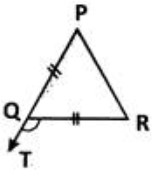
(A) 60°
(B) 140°
(C) 120°
(D) 100°
Answer : (c) 120°Show Answer :
Hint:
ΔPQR is isosceles since PQ = QR.
∴ ∠QPR = ∠QRP = 60° ∠RQT is the exterior angle of ΔPQR which is equal to the sum of interior opposite angles ∠P and ∠R.
Hence, ∠RQT = 60° + 60° = 120°.
Question 53: Which among the following is used to construct a triangle?
(A) The lengths of the three sides.
(B) The perimeter of the triangle.
(C) The measures of three angles.
(D) The names of three vertices.
Answer : (a) The lengths of the three sides.Show Answer :
Hint:
S.S.S. criterion can be used indirectly to construct a triangle given the lengths of its three sides.
Fill in the blanks:
Question 1: The exterior angle of a triangle is equal in measure to the sum _____________ of opposite angles.
Answer : InteriorShow Answer :
Question 2: The total measure of the three angles of a triangle is __________.
Answer : 180°Show Answer :
Question 3: Sum of the lengths of any two side of a triangle is _________ than the length of the third side.
Answer : greaterShow Answer :
Question 4: In any right angled triangle, the square of the length of hypotenuse is equal to the sum of the ________ of the lengths of the other two sides.
Answer : squaresShow Answer :
To construct a triangle of following sets of measurement given.
Question 5: _________ sides.
Answer : threeShow Answer :
Question 6: Two sides and the angle ________ them.
Answer : betweenShow Answer :
Question 7: Two angles and the side _________ them.
Answer : betweenShow Answer :
Question 8: The hypotenuse and a _______ in the case of a right-angle triangle.
Answer : legsShow Answer :

